Responsibility. It’s something I feel passionate about, for myself and others. I’ve not always been good at recognizing how to handle other’s responsibilities. If you’ve ever found yourself similarly confused, I encourage you to read Compassionate Accountability: How Leaders Build Connection and Get Results author Nate Regier Ph.D. and Marshall Goldsmith.
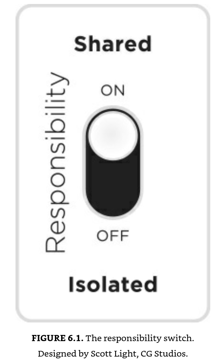 Isolating responsibility can mean taking on too much or too little ownership of our feelings, thoughts, and behaviors. Because most of us don’t recognize when our responsibility switch is off. I’ve decided to dedicate two blogs to Responsibility. This one is to recognize when the switch is off, and the next is for when your responsibility switch is on.
Isolating responsibility can mean taking on too much or too little ownership of our feelings, thoughts, and behaviors. Because most of us don’t recognize when our responsibility switch is off. I’ve decided to dedicate two blogs to Responsibility. This one is to recognize when the switch is off, and the next is for when your responsibility switch is on.
Your Responsibility Switch is Off
When our responsibility switch is off, we lose track of the fundamental truth that we cannot control others, but we can control our responses. To mask our discomfort or inadequacies and avoid difficult conversations, we isolate responsibility in ways that get us further away from real solutions.
When our responsibility switch is off, we forget or abandon the boundaries about who’s responsible for what.
These five clusters of observable behaviors let us know the responsibility switch is off:
- Avoiding taking responsibility for our feelings, thoughts, or behaviors – (see meeting example below)
- Taking over responsibility for others’ feelings, thoughts, or behaviors – (see meeting example below)
- Attacking or blaming to isolate responsibility – Calling out someone in public, and shaming them is an obvious situation where our Responsibility Switch is off. Most attacking and blaming behavior are leaders who feel embarrassed, angry, frustrated, or otherwise desperate. Something happened that reflects poorly on them, or they take it personally. Leaders shouldn’t look the other way or let bad behavior slide. Clarify who’s responsible for what, have respectful and difficult conversations when needed, no excuses, no blaming, no avoiding.
- Turning conflict into a win-or-lose power struggle -
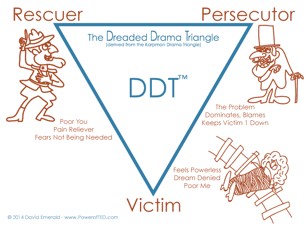 Differences and disagreements are viewed as threats to our identity, power, or position, so we enter conflict expecting a winner and loser. For more see Drama Triangle
Differences and disagreements are viewed as threats to our identity, power, or position, so we enter conflict expecting a winner and loser. For more see Drama Triangle - Focusing on self-preservation and self-promotion - When our responsibility switch is off and it looks like things aren’t going well, we run for cover. In most workplaces, a lot of wasted energy is spent maneuvering to stay out of harm’s way, shift blame in case something backfires, make excuses, or otherwise play it safe.
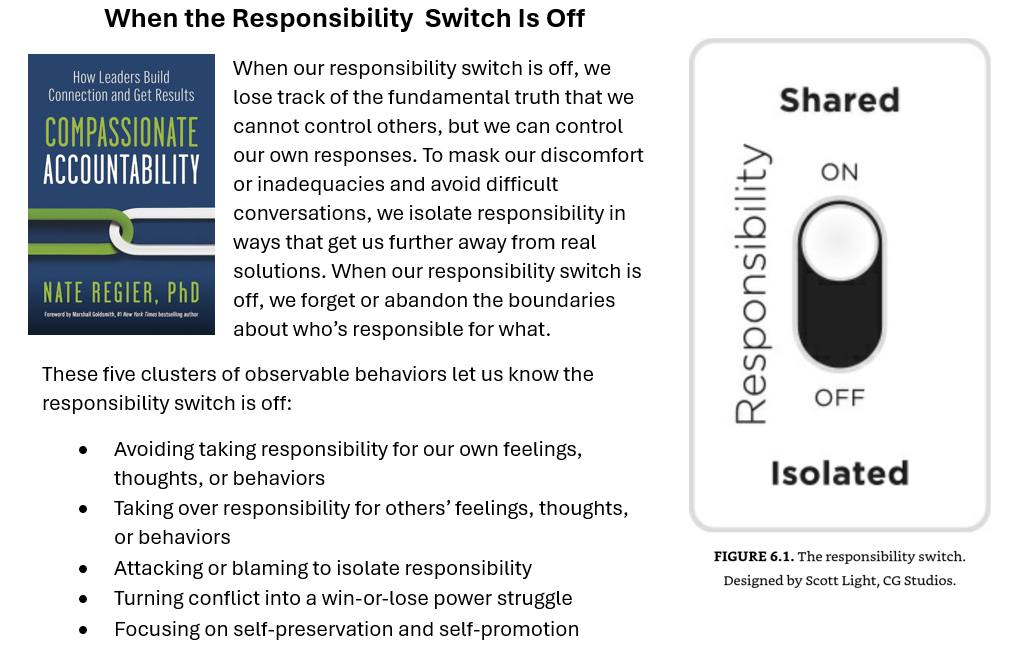 Let’s explore a common scenario in Avoiding Taking Responsibility for Our Feelings, Thoughts, or Behaviors together with Taking over responsibility for others’ feelings, thoughts, or behaviors. I’ve struggled with this same scenario in business and in my coaching practice.
Let’s explore a common scenario in Avoiding Taking Responsibility for Our Feelings, Thoughts, or Behaviors together with Taking over responsibility for others’ feelings, thoughts, or behaviors. I’ve struggled with this same scenario in business and in my coaching practice.
Responding to an Unprepared Meeting
In advance of an important executive team meeting, you sent out an email to your team with an agenda and two documents attached. You asked your team to review these before the meeting. You intend to make sure everyone’s informed about the big decision on bonuses. The team is expected to vote on a decision. When the meeting begins, you ask the group, “Did you all have a chance to review the documents I sent out?” Several people look at you with blank stares. One person says, “I never got it.”
What do you do next?
What thoughts go through your head?
What feelings do you experience?
With the responsibility switch off, you might respond by quickly checking your Sent email folder hoping to prove to yourself that you did your part and that they are at fault. Another way to isolate responsibility would be to poll the group to see who got the email and read it, thereby singling out the people who didn’t.
You could do what many well-intentioned leaders do when things don’t go as planned: divert attention away from the real issue by saying, “Well, I sent it out last week,” as if reminding people that you did your part somehow fixes things.
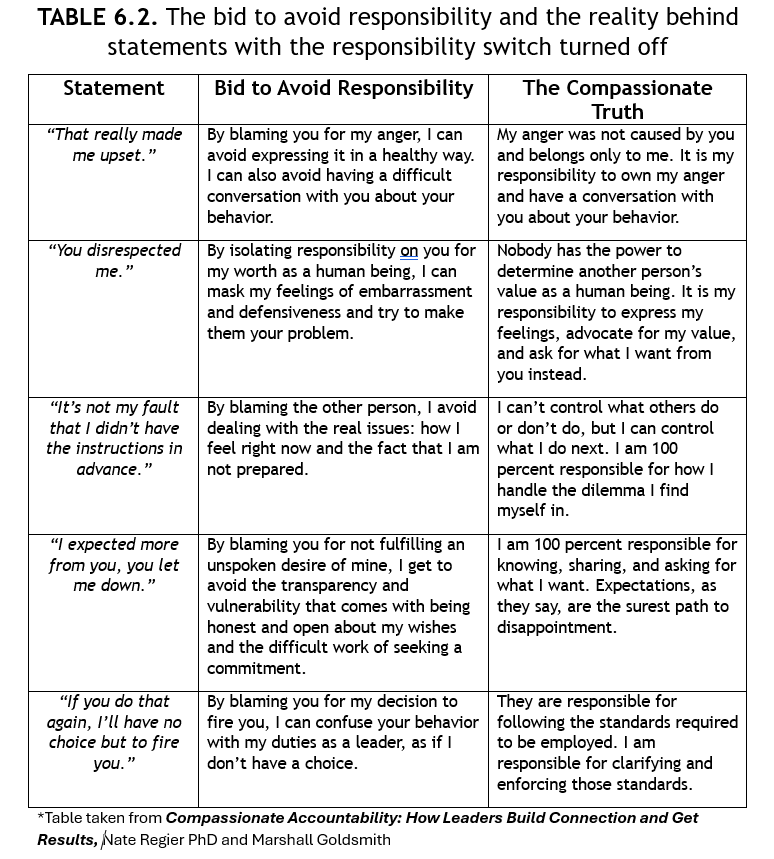 But it doesn’t because you aren’t dealing with two important issues.
But it doesn’t because you aren’t dealing with two important issues.
- The first issue is that you didn’t get what you wanted. Several people aren’t prepared for your meeting, and that’s a problem.
- The second issue is how you feel about it. Are you angry? Discouraged? Frustrated? Defensive?
A leader with their responsibility switch on says, “I can’t control what happens to me, but I can control what I do next. How will I take personal responsibility for my feelings and what I want and then address the relevant behaviors respectfully?”
Revisiting this scenario where your executive team isn’t prepared to vote on bonuses.
Here are two ways you could respond with your responsibility switch on that take on neither too little nor too much responsibility:
- “I feel stressed about this situation because I wanted everyone to be prepared. What ideas do you have for how we can be most productive under these circumstances? Everyone must be up to speed before we vote.”
- “I feel discouraged about this. I was looking forward to getting closure on this topic, but we can’t vote until everyone is up to speed. This will delay our bonuses. If we postpone until next week and I make sure everyone has it, will you all commit to reviewing the materials in advance so we can come ready to vote?”
In either case, the leader owns their feelings, takes responsibility for what they want, and asks for help to find a solution.
In the second response, the leader takes responsibility for enforcing a natural consequence without pointing fingers by focusing on the desired goal rather than acting out a whodunit.
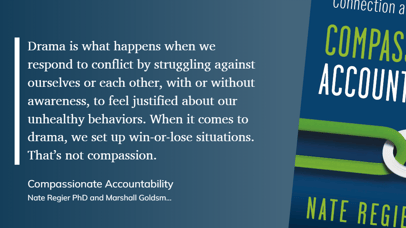 In “The Value Switch,” you learned how important vulnerability is and how hard it can be to own and share our emotions and experiences.
In “The Value Switch,” you learned how important vulnerability is and how hard it can be to own and share our emotions and experiences.
Leaders often try to shift responsibility in these situations to avoid vulnerability, bypass conflict, or hide their lack of skill in handling a situation effectively.
The first act of personal responsibility as a leader is to get crystal clear about what they are and aren’t responsible for. Taking too much or too little responsibility for our own and others’ feelings, thoughts, and behaviors has the long-term impact of undermining value and capability.
An important leadership skill is helping others navigate this difficult boundary as well.
Table 6.3 from Compassionate Accountability: How Leaders Build Connection and Get Results clarifies how to take responsibility and Compassionate Accountablity.
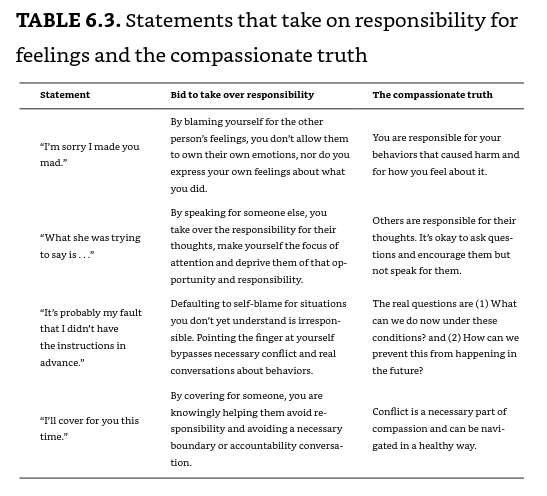 To create an environment where everyone is inspired to give their best, contact Positioning Systems to schedule a free exploratory meeting.
To create an environment where everyone is inspired to give their best, contact Positioning Systems to schedule a free exploratory meeting.
Turn your team into a growth organization.
Growth demands Strategic Discipline.
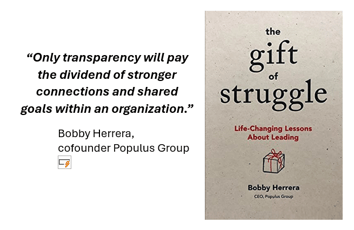 Next blog, we’re going to turn your responsibility switch on. You’ll take ownership of your emotions, thoughts, and behaviors, learn how to allow others do to the same, ask assertively for what you need and want, and enforce boundaries and commitments without blame, threats, and attacks. We’ll also help you to keep the most important thing, most important!
Next blog, we’re going to turn your responsibility switch on. You’ll take ownership of your emotions, thoughts, and behaviors, learn how to allow others do to the same, ask assertively for what you need and want, and enforce boundaries and commitments without blame, threats, and attacks. We’ll also help you to keep the most important thing, most important!
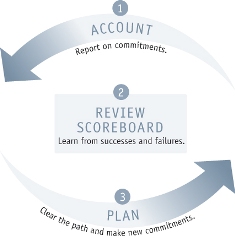 Building an enduring great organization requires disciplined people, disciplined thought, disciplined action, superior results, producing a distinctive impact on the world.
Building an enduring great organization requires disciplined people, disciplined thought, disciplined action, superior results, producing a distinctive impact on the world.
Discipline sustains momentum, over a long period of time, laying the foundations for lasting endurance.
A winning habit starts with 3 Strategic Disciplines: Priority, Metrics, and Meeting Rhythms. Forecasting, accountability, individual, and team performance improve dramatically.
Meeting Rhythms achieve a disciplined focus on performance metrics to drive growth.
Let Positioning Systems help your business achieve these outcomes on the Four most Important Decisions your business faces:
|
DECISION |
RESULT/OUTCOME |
|
PEOPLE |
|
|
STRATEGY |
|
|
EXECUTION |
|
|
CASH |
|
Positioning Systems helps mid-sized ($5M - $500M+) businesses Scale-UP. We align your business to focus on Your One Thing! Contact dwick@positioningsystems.com to Scale Up your business! Take our Four Decisions Needs Assessment to discover how your business measures against other Scaled Up companies. We’ll contact you.
NEXT BLOG – Turn Your Responsibility Switch On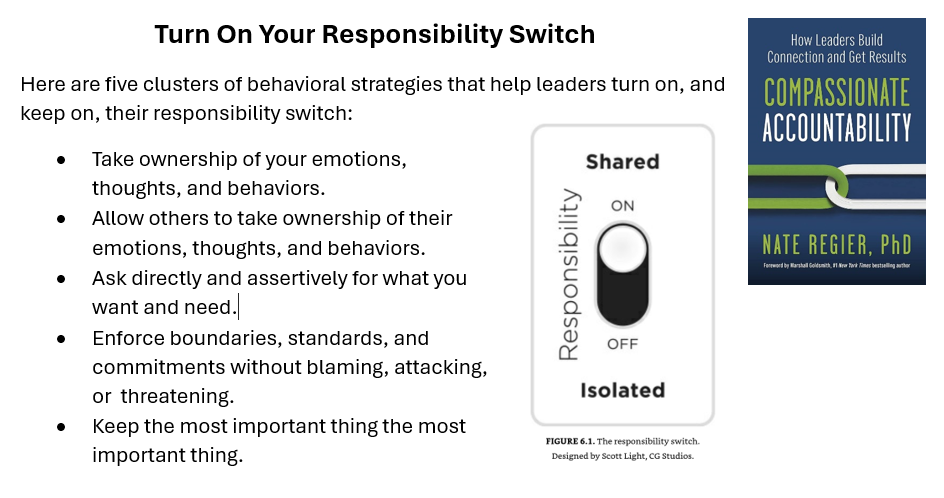






.jpeg?width=150&height=135&name=Hand%20with%20marker%20writing%20the%20question%20Whats%20Next_%20(1).jpeg)

